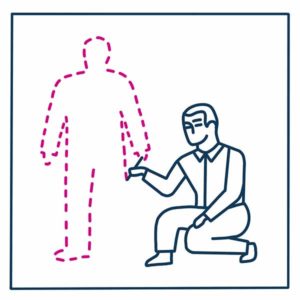Burnout is exhaustion. It’s mental exhaustion. Physical exhaustion. Emotional exhaustion. Maybe even spiritual exhaustion.
It’s an overload of your resources. Of your coping mechanisms. It’s a feeling of emptiness characterised by an “extinction of your motivation or incentive.”
It’s, to summarise, not a very nice place to be. But you can be on the road to burnout and pull back from the abyss.
And here’s the better news: you can protect yourself so you never even step foot on the road to burnout in the first place. Let’s find out how.
“I am not burning out but I want to protect myself. What should I do?”
Knowledge is power.
Given the right set of variables coinciding, anyone can be at risk from workplace burnout.
That’s why being aware of the signs and spotting them are so important.
There are plenty of risk factors for burnout at work. Some are environmental. Some are genetic.
Some are stressors from your personal life that leak into the workplace.
You aren’t getting enough sleep: sleep deprivation lowers your natural defences, making you more susceptible to both physical and mental strain
You don’t get to ‘switch off’ and recuperate: human beings are designed to alternate work and rest. If you can’t rest, you can’t recuperate
Your brain feels chaotic and frazzled: a racing brain drains energy, triggers anxiety and interrupts sleep. It can turn into a vicious cycle
You feel like you’re on the edge: your resilient and confidence are low, you’re scared of confrontation, you feel like you have no defences
You have nowhere to go for help: or you just think you don’t. Either way, you feel alone and powerless to prevent the slope getting more slippery
You feel like you have no time: the clock is always against you and you constantly feel like you need more time than you have and will never catch up
You have intense personal responsibilities: young kids or a carer’s role can really break down your resilience. It’s the unyielding nature of it that does the damage
You feel perfect is the only option: no matter what life throws at you, you refuse to cut down your to-do list or standards to give yourself room to flex
Your energy drains faster than you top it up: you won’t win this battle. If you can’t regenerate energy, you’ll end up running on empty. The only outcome is burnout
“I think I’m on the path to burnout. What should I do?”
1. The golden rule: prioritise your own wellbeing
Even if you realise you’re on the path to burnout, it’s hard to put on the brakes. Because it involves making your own wellbeing a priority.
For those with young children or loads of responsibility at work, this is very hard to do.
But it’s important: burnout happens when you de-prioritise your own wellbeing for everything else in life. The problem will get worse unless you intervene.
And if you can’t do it for yourself, do it for those you love. You’re better able to meet their needs, after all, if you’re actively protecting yourself from burnout.
2. You need to exercise. Just get cracking
We won’t bang on about the general benefits of exercise. The evidence is indisputable.
But for those on the road to burnout, it’s important to highlight a few.
Firstly, exercise releases endorphins which lower stress levels. It also improves your mood. And it increases your energy levels.
That’s pretty exciting if you’ve got low energy, poor mood and high stress – three signs of impending burnout.
3. You need to get a PhD in your energy needs
Everyone has an “energy profile.”
I need nine hours of sleep to function. Reading restores my energy like nothing else. If I don’t eat well, I lose energy quickly. Eating breakfast too early makes me sluggish all day.
What’s your energy profile? You need to know it intimately. And then you need to prioritise meeting your energy needs.
This is especially true in today’s society when we confused being overworked with being overwhelmed.
Feeling overwhelmed often coincides with your energy draining like water from a punctured hose.
If you know how to rebuild your energy, you can patch the puncture quickly.
“I think I’ve burnt out or I’m on the brink. What should I do?”
1. You should temporarily extract yourself from the situation
The above tips are about managing the symptoms of burnout. You’re no longer in that stage.
You must temporarily stop ‘hostilities’ in order to recover.
This requires you to be humble, mature and to use those around you – you can’t escape burnout unless you lean on others.
How you do this depends on the root cause of burnout. It may be that a project at work has led you to burnout.
This requires you to be honest with your manager and take time out from the project.
What you need is recuperation time and the removal of the stimuli that are tipping you over the edge.
2. You should temporarily pause expectations of yourself
Perfectionists are at a particular risk of burnout. Why?
Because they have ironclad expectations of how they should act and behave. They think that if they fall below these standards they are failures.
Whether you’re a perfectionist or not, if you’re on the road to burnout you need to temporarily pause or lower your expectations. Because the reality is – you’re not coping.
And the more you expect yourself to cope when you don’t have the resources to do so, the closer you’ll get to burning out.
More generally, it’s important to remember that having fluid expectations is a healthier approach to life and more fitting for human beings with varying energy levels and mood.
3. You need to ask people for help and find a support network
Many people cope very well. Until they don’t cope at all. In other words, people tend to hide their struggles well.
This is particularly true in the workplace, where there’s been a ‘stiff upper lip’ culture and an unfortunate perception that not being able to cope is a sign of weakness.
And yet the reality is that burnout requires intervention from people who are in the best place to help you. Why?
Burnout means your coping mechanisms aren’t working. And yet you still need to carry on with life. So, you need others around you to help you cope.
You need to lean on people you trust: this can be family, close friends, colleagues or managers you trust.
Their support needs to come from two angles: emotional support, of course, but also temporarily or permanently removing the issues that are most implicated in burning you out.
4. When recovered, you should remember you’re always susceptible
If you’ve ever had an injury from going to the gym, you know that once it’s better, your workouts are never quite the same again.
Quite rightly, you’re more careful. You’ve still got your eyes on the prize, but you’re a bit more humble.
Sometimes it takes burnout to make wellbeing a priority. If this happens, be grateful that you’re wiser.
Don’t be a slave to fortune, of course, but always remember you’re susceptible to burnout and may need to make permanent, positive changes to your lifestyle.
Becoming more resilient at work is an important step to prevent workplace burnout. Multitasking contributes to poor resilience, so find out how to stop multitasking at work.







